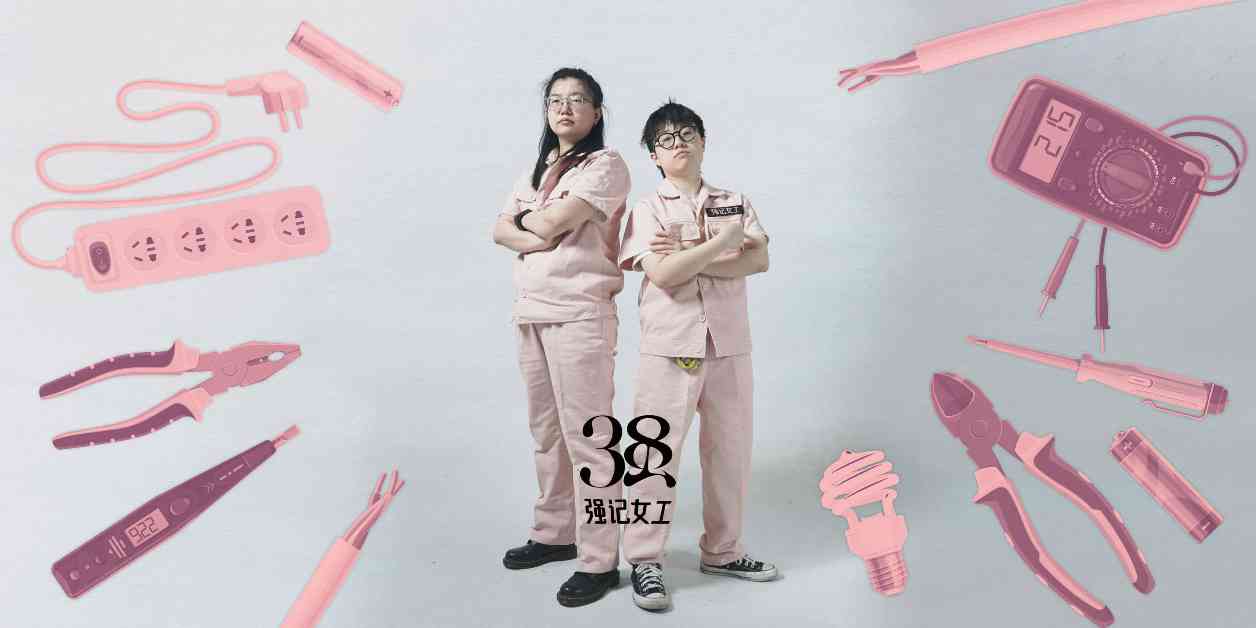Empowering Women in Chengdu to Succeed in Male-Dominated Trades
In a small room in the southwestern city of Chengdu this past July, a group of women huddled over circuit boards, appliances, and power tools, carefully assembling and wiring electrical systems. Over 10 days in this all-women class, they progressed from basic tasks like wiring lamps to understanding the complex setups found in industrial machinery, including how robots are powered. By the end, they earn a junior electrician certificate — a credential that could open doors in a trade long dominated by men.
The course was founded by Li Xiaoxiao, a former advertising executive who was struck by how few women she encountered in technical trades. Determined to change that, she created Qiangji Women Workers (known in English as 38 Fix), an all-women electrician class to offer hands-on training and a professional certification.
“One of the reasons why so many signed up to take the class is that many women are taught that this is not what they should do. Their interests are suppressed. This class offers them a new path,” Li tells Sixth Tone.
Since it was announced in April, the class has received an overwhelming response. A post on the lifestyle app Xiaohongshu promoting the one-day session garnered around 2,500 likes, with many users calling for similar courses to be offered outside Chengdu. According to the organization, about 250,000 people expressed interest in signing up, and the first class, held in June, was fully booked within a day.
Designed to offer services exclusively for women, including training in electrical work and repairs, they offer a range of classes, from home appliance cleaning to electrician courses that teach both theoretical knowledge and practical techniques.
In collaboration with the Chengdu Human Resource and Social Security Bureau, some classes are free for those who pay social security. The electrician course, however, costs 288 yuan ($40) for a one-day session and 1,900 yuan for the full 10-day program, which includes the junior electrician certificate exam.
The surge in interest for an all-women electrician course mirrors a growing trend across China. As more women live independently, they’re seeking female-led technical services for greater convenience and security.
Fulfilling Dreams in Male-Dominated Fields
For years, Feng Yanran worked a comfortable job in public relations at a top Chinese tech giant in her hometown of Chengdu. But deep down, she was always drawn to working with electricity.
In her first apartment after graduating, Feng rented a small room. With no storage racks or wardrobe, she bought steel frames and built her own. Holding the drill, she realized she could create her own world. “I soon learned to install lamps and switches, and even helped friends with electrical repairs. It gave me a sense of pride,” the 24-year-old says.
Yet, every time Feng tried to fulfill her dream, she hit the same obstacles: online training classes that were all theory and no practice, and seasoned electricians who either ignored her or flatly told her, “We don’t accept female apprentices.”
So when she saw an ad from Qiangji Women Workers offering hands-on training, Feng took the leap — quitting her steady job to pursue the career that had always felt just out of reach. She signed up for the advanced class, which also offered a junior electrician certificate.
With just 20 students, the advanced class attracted those serious about becoming electricians. Feng was the only one still holding down a job. The course, which ran from 9 a.m. to 5 p.m. starting July 8, was taught by three rotating vocational school instructors. “We felt respected,” says Feng, adding that teachers encouraged them by highlighting the achievements of women workers in their factory.
Before enrolling in the electrician class, Feng had also taken a free weekend course in June on home appliance cleaning, learning how to clean air conditioners, washing machines, and stoves. “Most students,” she explains, “want to gain these skills to handle the tasks themselves or avoid overpaying for professional cleaning, which can cost hundreds of yuan.”
Tan Jiasun, a 29-year-old social media editor at a domestic news outlet also in Chengdu, applied for the one-day electrician class out of curiosity with a friend. Such was the demand that Tan only secured a spot after a last-minute cancellation.
The class, taught by a female electrician from a local mechanical vocational school, covered the basics of common circuits and included hands-on practice. From drawing circuit diagrams to stripping wires and connecting them to appliances, each participant completed a parallel circuit for a lamp and an outlet by the end of the session.
“Everyone in the class was passionate and curious,” says Tan, underscoring how the instructor encouraged exploration and offered practical advice, such as replacing sockets and installing separate switches for lights — particularly relevant for single women. “No one’s phone rang, either, and no one left for cigarettes or other business the entire day, which is very unusual.”
Breaking Barriers in the Electrical Trade
Li Xiaoxiao, the 33-year-old founder of the all-women electrician course, wasn’t always in the electrical trade. She first attended an electrician class herself but left dissatisfied — it was too focused on theory, and the absence of other women made her uncomfortable. It made her wonder if all women felt the same.
“Living alone for nearly a decade, I had already learned practical skills to maintain my own home appliances. And my job planning exhibitions also gave me hands-on experience installing machinery and signboards,” says Li. Seeing how few women worked in technical trades, she decided to launch her own all-women course to change the landscape and offer women the opportunity to enter the field.
But breaking into such male-dominated trades hasn’t been easy. Even in the all-women home appliance cleaning class, Feng encountered stereotypes from the male instructor. During the class, she asked if they could learn to refill the gas in air conditioners, a skill in high demand.
The instructor replied that only workers with a special permit to work on elevated platforms were allowed to do so. When Feng asked how to obtain such a permit, he remarked, “I have never seen a woman take the exam!”
“I understand that he probably didn’t mean to be sarcastic or harmful,” says Feng. “His limited perception shaped what he said.”
According to Li, many companies avoid hiring women electricians for door-to-door maintenance jobs. As a result, women often choose to teach at vocational schools or take on advanced projects like furnishing new houses — further discouraging newcomers from entering the field.
Yet, the demand for women workers is rising. Data from the Beike Research Institute, a private research institute focusing on real estate, predicts that by 2030, 150-200 million people in China will live alone, with the number of young adults aged 20-39 living solo growing from 18 million in 2010 to as many as 70 million. At least half of them will be women.
“As the number of single women rises, more are expressing concerns on social media about having male workers in their homes, especially at night,” says Li.
Liao, a 29-year-old finance worker and founder of Xiugou Everything House, a platform offering door-to-door services for women, has also noticed the trend.
“When I first moved to Shanghai seven years ago, I was always worried that no one would know if something happened to me in my apartment,” says Liao, requesting to be identified only by her surname for privacy reasons. She hopes to build a platform that offers safety and support for women living alone, like herself.
In September 2023, the platform was launched as a mini-program on the social super app WeChat, offering door-to-door repair services for women, linking users with nearby female repair workers. All users must pass a real-name identity check, and workers are required to present relevant certificates to customers.
In addition to repairs, users can request services like dog walking or hospital accompaniment. The platform now has thousands of daily active users, with more than 900 orders placed so far, according to Liao.
But with only 400 orders received and completed — all for electrician services — Liao underscores the widening gap between supply and demand. Out of 3,000 registered service providers, only 138 are electricians, most working part-time.
“Some customers still believe male technicians are more professional,” says Liao. “When they seek out female technicians, they fall into two categories: those who feel safer with a woman because they live alone, and those who expect to pay less, thinking women should charge less than men.”
Challenging these stereotypes is central to Li’s mission. The logo of Qiangji Women Workers features the number 38 for Women’s Day and qiang is the Chinese character for “strong.” “Many women don’t realize they unconsciously view themselves as weaker than men,” says Li.
While acknowledging that men may have a physical advantage, such as in lifting heavy objects, she insists it’s not a reason to exclude women. “The difference isn’t significant enough to keep women out,” she asserts. “With the right tools and techniques, physical limitations can be overcome. In fact, women often excel in tasks that require precision and patience.”
In recent months, both Li and Liao have faced criticism and even a few personal attacks online, with some questioning whether their efforts to help women are motivated by profit.
Li, however, distances herself from labels. “I don’t know what being a feminist really means, and I don’t want to be confined to that label, as if speaking up means everyone has to listen to me. I just want to do what I feel like doing right now,” she says.
Despite running a small advertising company, Li devotes most of her time to Qiangji Women Workers. The revenue from the platform mainly goes toward paying salaries, teachers, and venue fees.
Looking ahead, Li hopes to train more professional women workers and expand the platform, creating more job opportunities for women electricians. Some rental and home appliance companies have already partnered with Qiangji to offer training and explore collaboration on women-led repair services.
Her efforts are already yielding results. Feng now receives orders for tasks like washing machine repairs and appliance maintenance. While she’s gaining experience, Feng knows her journey isn’t over.
She still aims to master more advanced skills and secure the permit required to work at heights — the certification her male teacher had mentioned in class. After he remarked that he had never seen a woman take the exam, Feng simply smiled and said, “That’s because you’ve seen too few women.”
Additional reporting: Zhu Yingcui; editor: Apurva.

















